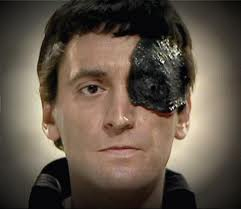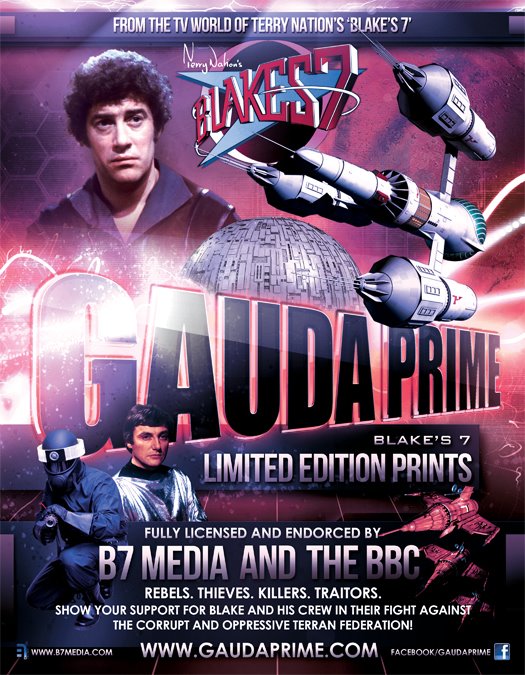 Alan Stevens produced and co-wrote three classic Blake’s 7 audios back in the 90’s. Travis: The Final Act, The Mark of Kane and Logic of Empire are still fondly remembered to this day. He was also the co-author of Liberation and his company Magic Bullet produce the critically acclaimed Kaldor City and Faction Paradox audio ranges.
Alan Stevens produced and co-wrote three classic Blake’s 7 audios back in the 90’s. Travis: The Final Act, The Mark of Kane and Logic of Empire are still fondly remembered to this day. He was also the co-author of Liberation and his company Magic Bullet produce the critically acclaimed Kaldor City and Faction Paradox audio ranges.
SA: Where did the idea for Travis: Final Act come from?
AS: Watching Blake’s 7 series one and two, and then meeting Alistair Lock and listening to an audio play he had written and produced. I thought it would be interesting to do an audio on Travis, as he struck me as a much neglected character. I put this to Alistair, and he was amenable, and so we went ahead. It was a huge undertaking, in that the equipment available to us in 1988 was a great deal more primitive then what is available today. I remember we wore out two typewriters when writing the script!
SA: How did you decide on the unusual mix of fact and fiction?
AS: There wasn’t a conscious decision as to how much to include one way or the other. What I did was watch the episodes, wrote down a number of questions I wanted to ask Chris Boucher, David Maloney, Stephen Greif and Brian Croucher, and then intercut their answers with the Travis story-line.
SA: Was Travis a favourite character of yours?
AS: No, not really, but I do like Brian Croucher, and at the time a lot of fans were attacking Brian, which I thought was unfair. Under the circumstances Brian did a damned good job as Travis. This is not to say that there was anything wrong with Stephen Grief’s interpretation, but I think there was a lot of misplaced prejudice against Brian, because he was an actor with a regional accent coming into a middle class show; we’re seeing something similar again with Christopher Eccleston in Doctor Who. I dislike prejudice, and I basically wanted to show that’s all it was, and that the character, as played by Brian, was as every bit as complex as that played by Stephen.
SA: Were the actors/crew happy to be involved?
AS: Yes. Brian is a very affable guy, and I had known Chris Boucher for some time. In fact, I recorded Chris’ contribution at his home in Ascot. He very kindly supplied us with a lot of beer!
David Maloney has a second home in the Forest of Dean, where I live, so it was easy to meet up with him. Stephen was a bit more difficult to get hold of, as, at the time, he didn’t do interviews, but he finally relented.
SA: Was it difficult tracking everybody down?
AS: Back then, I only knew Chris Boucher. I got David Maloney’s address off Chris, and contacted him out of the blue, which didn’t seem to phase him in the slightest. My contact with Brian Croucher came about at a convention in Birmingham, and his contribution was recorded in a hotel room.
SA: Where did the idea for The Mark of Kane come from?
AS: It came from Travis: The Final Act, in that, having done a documentary; I then decided to do a drama on the same theme.
SA: Was it easy to persuade Gareth Thomas to take part?
AS: He seemed happy to be involved. The actual contact was made through Diane Gies of the Blake’s 7 fan club Horizon. Gareth drove down from Scotland to London to do the recording, and I remember him being absolutely hilarious. Later, of course, he came back and did a cameo for The Logic of Empire.
SA: Was it difficult recording the play?
AS: Not really, no. Although I did get blind drunk the previous night and was violently sick in the morning.
SA: Is it true that the different actors were recorded at different times/places?
AS: Yes, but that’s standard practice in audio productions, although I do remember someone saying in a review somewhere that they were impressed with the way Gareth Thomas and Terry Molloy sparked off each other, and I thought, “yes, considering they were recorded three months apart.”
SA: A theme of your plays is filling in the gaps left by the series – was this an element of the show that irritated you – all the loose ends?
AS: No, I like loose ends. If it wasn’t for loose ends I couldn’t have written The Mark of Kane and The Logic of Empire. Also, as I think Fiona Moore and I demonstrated in the Blake’s 7 book Liberation, what some fans think are loose ends aren’t loose ends at all.
SA: Did you have to approach the BBC for permission to produce the plays?
AS: No, because the BBC do not own Blake’s 7.
SA: Chris Boucher and Vere Lorrimer provide introductions to the plays. Did they have any other involvement?
AS: Vere didn’t, but some of my ideas did arise out of previous discussions I’d had with Chris.
SA: Were you happy with fan reaction to the plays?
AS: They seemed to like them, therefore I was happy. I still occasionally get people writing in asking if they are available, or telling me that they had recently listened to one of them, having found a copy on ebay.
SA: Where did the idea for The Logic of Empire come from?
AS: I was sick to death of hearing some fans going on about how the Blake’s 7 crew weren’t really dead, and how the Federation guards used stun guns. So I decided to write a story were it was proved that they were dead after all. I suppose you could see it as my contribution to the debate.
SA: Did Paul Darrow and Jacqueline Pearce take much persuading to take part?
AS: Diane Gies got back to me and said that Paul had heard the tapes and was keen on being involved. As for Jacqueline, Diane Gies also approached her on my behalf. According to Diane, Jacqueline was keen to come back and appear with Paul Darrow.
SA: The play seems to suggest that Avon survived the events of Blake with the help of Dorian’s creature. Was this your intention?
AS: Yes, and at the time I wrote a tie-in short story called “Premature Burial” with David Tulley to that effect. This story can still be found on kaldorcity.com.
SA: Were you concerned that a sequel to Blake might lessen the impact of the episode?
AS: Initially I was very reluctant to write any sequel to Blake for that exact reason, as I couldn’t see any way that Blake, Avon, or the rest of the crew could have survived. I remember once taking Tony Attwood to task over his book Afterlife where he totally ignored the gunfire heard over the closing credits, and had Avon led away to a prison cell. Basically, my view was that everything that we saw and heard during the episode Blake happened, and therefore any sequel would have to take that into account. Eventually David Tulley came up with the “Dorian room” idea and I said, “yep, I can buy that. Avon was saved through supernatural means.” This then allowed me to kill everyone else and have Servalan state categorically that they were all dead.
SA: Did you consider bringing back other characters in the play?
AS: No. My purpose was to bury Blake’s 7, not to save it (pun intended).
SA: The ending to Logic of Empire was a stroke of genius. Where did the idea come from?
If you mean the ending where Avon becomes Blake, then I’m afraid that I don’t know where that came from; it just popped into my head. If you are referring to the idea that the Federation needed enemies to survive, I suppose I was thinking of the politics of the Reagan era, when the US seemed to be shoring up international and domestic support by creating enemies, which is basically what they are still doing now under Bush.
SA: Are you happy with the end product?
AS: I listened to The Logic of Empire last week, which was the first time in about five years. I was expecting to hate it, but as it turned out, even if I do say so myself, I thought it was pretty good. In fact it appeared to cover all the major themes (conspiracy, deception, and supernatural death) that have turned up again in Kaldor City. I must be obsessed.
SA: Will the Blake’s 7 plays ever be re-released?
AS: One day perhaps. Who knows?
SA: “Liberation” really is a Blake’s 7 fanboy’s dream come true! What inspired you to write it and were you pleased with fan’s reaction to it?
AS: It’s not really of a question of it being inspired by anything, but rather that I had a large collection of material relating to the series, and both Fiona and I had a lot of ideas about the series, and we needed to find some kind of outlet for this. The fan reaction appears to have been positive, therefore, yes, I was pleased.
SA: Your theories regarding Gan were somewhat controversial.
AS: I don’t think they are controversial. The Idea that Gan was really a rather nasty murderer has been going around in fan circles since at least the early 1990s.
SA: Do you stand by them? (I can’t look at him in the same way since reading the book)
AS: Of course I stand by them, and have successfully argued them to people who have tried to counter them. In fact, if anything, I am even more convinced now, because since writing the book, I’ve had more of a chance to look at the writings of Terry Nation and the series’ antecedents. The idea of a secret murderer or traitor is a theme that recurs constantly in Terry Nation’s work, whether in the original idea that Tarrant was going to be a traitor, or the appearance of the Tom Price character in Survivors, or Dan Galloway in Death to the Daleks, or any number of others. Secondly, this idea also turns up in a lot of the films and stories that had a direct or indirect influence on Blake’s 7, for example the character of Maggott in The Dirty Dozen.
SA: How did the Kaldor City range come about?
AS: I wanted to do an audio series starring Paul Darrow as a Clint Eastwood type character who comes into town and starts a minor war. I then read a Doctor Who book by Chris Boucher called Corpse Marker, which was a sequel to the Doctor Who story The Robots of Death; was set in Kaldor City; and featured the psychostrategist Carnell from Chris’ Blake’s 7 story Weapon. So I rang up Chris and asked if I could do a sequel on audio to his book featuring a Clint Eastwood type character (played by Paul Darrow) coming into Kaldor City and starting a minor war. Chris said that it sounded like a good idea, and if he liked the script then he’d give me the go-ahead. So I wrote the script with Jim Smith, sent it to Chris, and he liked it and the series went ahead.
SA: Kaldor City is an unusual mix of Blake’s 7 and Doctor Who. Was it difficult to market the range?
AS: Well, I don’t see how the mix was unusual, as it had already been done before in Chris’ book Corpse Marker. Also, the series had less to do with Blake’s 7 and Doctor Who and more to do with characters and themes that Chris Boucher had devised, or worked on. The Blake’s 7/Doctor Who elements in fact made it very easy to market, as it appealed to both sets of fans. I know there are some Doctor Who fans who hate Blake’s 7, and there are some Blake’s 7 fans who hate Doctor Who, but I like both shows, and, to be honest, this rivalry makes no sense to me at all. Many of the people who worked on Doctor Who also worked on Blake’s 7, and visa versa. Both shows were an influence on each other, and, indeed, one of the best Doctor Who stories of all time, The Caves of Andrazani, has more in common with Blake’s 7 than Doctor Who. Equally, Blake’s 7 owes a hell of a lot to The Daleks’ Master Plan.
SA: Are you happy with the genre press coverage?
AS: No. I would prefer it if Doctor Who magazine, Starburst, Dreamwatch, TV Zone and SFX had donated every issue to the promotion of Kaldor City. I’ve suggested it to them on a number of occasions, but they seem to think I’m having a laugh.
SA: Kaston Iago is a man with a past. Will we ever learn more about his background?
AS: No.
SA: What are your plans for the future of the range?
AS: There are none, at present, as I am busy working on the new Faction Paradox audio series, which is all about battles with Egyptian gods and features Julian Glover as Upuat, Gabriel Wolf as Sutekh, Isla Blair as Merytra and Peter Miles as Anhor. Everyone’s very enthusiastic about it and I think it’s going to be a great series.
This article originally appeared in Scorpio Attack fanzine by Jonathan Helm


